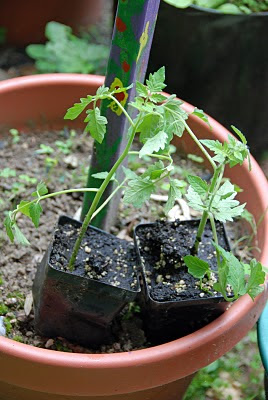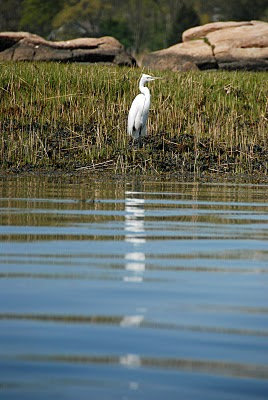
Friday night in the car, Amy and I were listening to Barbara Kingsolver's book
Animal, Vegetable, Miracle, which we have been listening to a bit at a time when Amy is driving, others are sleeping, and I am either sleeping or not. It's an interesting book about Kingsolver's family's recent efforts to grow some of their food and eat locally for a year. She tries to be sufficiently down-to-earth to avoid sanctimony, with mixed success. But there are wonderful moments in the book. Friday night we listened to Kingsolver's thoughts about the way growing, harvesting, cooking or eating food can connect us instantly with long-gone relatives. And there we were, on our way to a weekend with our friends Miriam and Brett. We had planned to pick strawberries together, and then Miriam would teach Sarah and me how to make strawberry jam.
My mother made huge batches of jam every year. She made strawberry jam, blackberry jam, cherry jam, blueberry jam, and peach jam (along with apple sauce); and when she was finishing one fruit and starting another she would mix one bit with another (blackberry-blueberry jam happened frequently). The counters of our summer kitchen always had jars lined up (empty and waiting to be sterilized, or full and cooling). The jams were delicious. We three boys elbowed in to try to get the prized "foam," the top of the jam that was skimmed off the pot and put aside before the real canning began. For some reason, the jam foam was the best part. By the end of the summer there would be sixty or eighty jars of jam for eating and giving away as visiting presents.

My parents took great pride in their strawberry beds. (I remember being about 12 years old and standing in the dark holding a flashlight so my parents could plant the strawberries that arrived that day, before they "dried out.") They also grew peaches and apples on their 1/2 acre lot. Blackberries had to be found growing wild in an undeveloped lot. I don't know where we got blueberries. It was a great revelation to me to move away and discover "pick your own" farms where you can pick as many berries as your stomachs and larder can hold.
This weekend, we picked over 20 pounds of small, intensely delicious strawberries (above you see Miriam and Brett with our harvest). Miriam, who spends more hours cooking than any other working person I know, topped most of them (thank you Miriam!). We probably ate a third of them raw for breakfast, lunch, dinner and snacks. The rest we made into jam.

The jam didn't quite set. I can almost, but not quite, hear my mother explaining why. (It could be we didn't add enough sugar or pectin, but I think she's saying we didn't boil it long enough.) In any case, it is incredibly delicious. It's probably too messy for a peanut butter & jelly sandwich, but is wonderful on a slice of toast or waffles. And it looks beautiful in the jar.
We shared the foam.












 You've got to wonder, though: What possessed anyone, hundreds of years ago, to decide to put these things in their mouths? Digitalis makes people sick; but somehow someone figured out that at some exact dosage, Digitalis could make certain sick people well.
You've got to wonder, though: What possessed anyone, hundreds of years ago, to decide to put these things in their mouths? Digitalis makes people sick; but somehow someone figured out that at some exact dosage, Digitalis could make certain sick people well.












